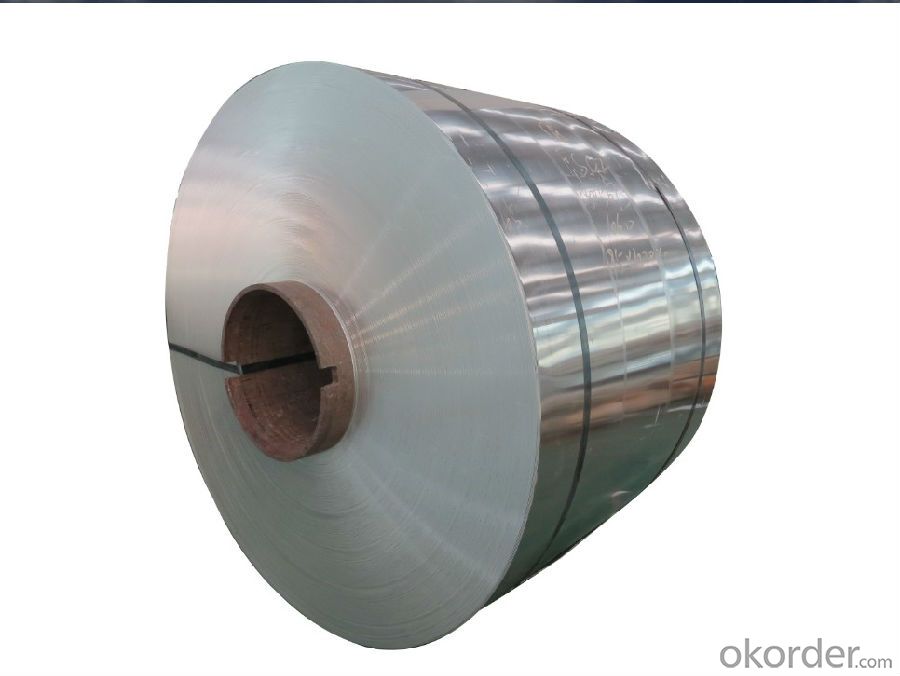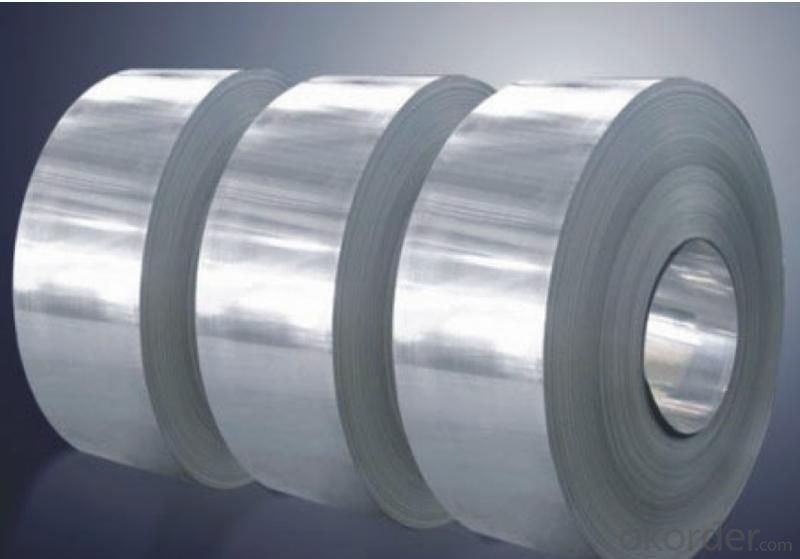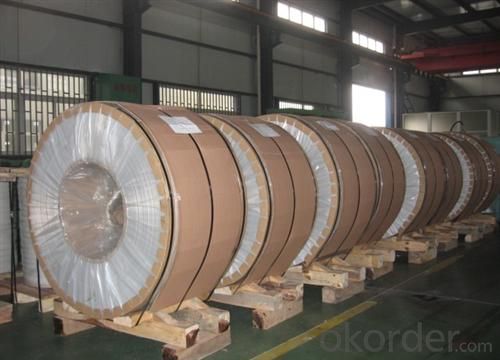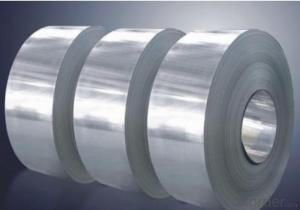Aluminium Alloy Plates/Coils series 1/3/5/6/8
- Loading Port:
- Shanghai
- Payment Terms:
- TT OR LC
- Min Order Qty:
- 5 m.t.
- Supply Capability:
- 90000 m.t./month
OKorder Service Pledge
OKorder Financial Service
You Might Also Like
Item specifice
6083 t651 aluminium alloy plate/coil price
Product Specification

| Alloy Band | 6061, 6063, 6082 |
| Temper | O, T4, T6, T651 and other |
Thickness | ≤170mm |
Width | ≤2200mm |
| Longth | ≤12000mm |
| Application | Automobile, Aviation, Electronics, Mold, Quenched plate, Pre-stretched plate, etc |
| Standards | ASTM-B209. EN573-1, GB/T3880.1-2006 |
| MOQ | 5 tons |
| Payment Term | L/C; T/T. |
| Delivery Time | Within 30 days after receipt of deposit. |
| Notice: We can according to customer requirement offer other different alloy band and state product | |

More products for you to choose
We produces and offers a full range of aluminum plate in several alloys to service a multitude of industries. The non-heat treatable alloys of 1000, 3000, and 5000 series are all strengthened by various degrees of cold working, as denoted by the "H" tempers.
The heat treatable alloys of 2000, 6000 and 7000 are such that when subjected to thermal temperatures, they again pronounced strengthening. Hence, tempers are indicated by "T". These alloys are also inventoried in clad form to increase corrosion resistance. All of the aluminum alloys are available in the annealed condition or commonly referred to as "O".

- Q:Can aluminum coils be used in solar panel applications?
- Indeed, solar panel applications can make use of aluminum coils. Aluminum, a lightweight and robust substance, finds widespread use across diverse industries, including the solar panel industry. The base material for solar panels often consists of aluminum coils owing to their corrosion resistance, exceptional thermal conductivity, and excellent electrical conductivity. These attributes render aluminum coils ideal for efficiently transmitting heat and electricity within solar panels, thereby guaranteeing optimal performance and efficiency. Additionally, aluminum stands as a highly sustainable material, as it can be readily recycled, making it an environmentally conscious option for solar panel applications.
- Q:I have a 94 Gt Mustang that has had a little work done to it so far. The boy I bought it from had an aftermarket cam put in it, had the heads ported and polished. He also had the heads shaved a little. My question is.........Would having aluminum heads with roller rocker arms installed help it enough to justify doing it. If it would, how Much would it help? I am not exactly sure how much life and duration my cam is running, but it idle pretty rough. I believe my compression is about 9.5 to 1.
- I also believe that the primary benefit of aluminum heads is weight savings...you can port and polish iron heads just the same. I also know that aluminum retains and dissipates heat differently than Iron.
- Q:Today at my school I was messing with this sketch thingy, the one with 2 knobs to twist up or down to draw, my friend decided to break it and when we broke it, this silver dust called aluminum powder got on my hands, I never knew it was dangerous cause your see, we never read the manual we just found it. About 3 minutes later he pointed to my hand and I saw blood. It kinda stung.
- The aluminum powder found in an Etch-a-Sketch will not cut you, it's much too small. In fact it's so small you could only see it's edges under a high powered microscope. The cut was most likely caused by jagged glass/plastic when you broke the Etch-a-Sketch open. It's not unusual to cut yourself and not realize until someone else sees you're bleeding.
- Q:How do aluminum coils contribute to recyclability in the construction industry?
- Aluminum coils play a crucial role in enhancing recyclability in the construction industry due to their inherent properties and characteristics. Firstly, aluminum is a highly recyclable material, meaning it can be recycled repeatedly without losing its quality or physical properties. This makes aluminum coils a sustainable and eco-friendly choice for construction projects. The recyclability of aluminum coils helps reduce the environmental impact associated with the construction industry. By choosing aluminum coils, construction companies can contribute to the conservation of natural resources and the reduction of energy consumption. Recycling aluminum requires significantly less energy than producing it from raw materials, resulting in a substantial reduction in greenhouse gas emissions and carbon footprint. Moreover, the use of aluminum coils in construction facilitates the dismantling and deconstruction processes, making it easier to separate the aluminum components from other materials. This efficient separation allows for the effective recycling of aluminum coils, ensuring that they can be transformed into new products or materials. Additionally, aluminum's durability and resistance to corrosion make it a suitable choice for construction applications. Its long lifespan reduces the need for frequent replacements, further minimizing waste generation and the consumption of raw materials. When the time comes to replace or renovate a building, the aluminum coils can be easily collected, recycled, and reintroduced into the manufacturing cycle, closing the loop of the material's lifecycle. In summary, aluminum coils significantly contribute to recyclability in the construction industry. Their high recyclability, low energy requirements for recycling, and ease of separation during deconstruction make them an environmentally friendly choice. By utilizing aluminum coils, the construction industry can promote sustainability, reduce waste generation, and conserve natural resources, ultimately leading to a greener and more circular construction sector.
- Q:How do aluminum coils compare to other non-ferrous metals like titanium?
- Aluminum coils are generally lighter, more affordable, and easier to work with compared to non-ferrous metals like titanium. However, titanium possesses superior strength, corrosion resistance, and heat resistance properties, making it a preferred choice for applications requiring high performance and durability.
- Q:Can aluminum coils be used in HVAC systems?
- Yes, aluminum coils can be used in HVAC systems. In fact, aluminum coils are commonly used as an alternative to traditional copper coils in many HVAC applications. Aluminum coils offer several benefits such as improved energy efficiency, corrosion resistance, and lighter weight, making them a popular choice for HVAC systems.
- Q:I bought some cheap aluminum foil, but one weighs much less than the other brand for the same thickness and length, why?What is the other made of? Is it still good to use for grounding something?Thank you.
- Aluminum foil is aluminum foil, it has nothing but aluminum in it. One of them is misstating the thickness, or you are mistaken about the weight or width.
- Q:Are aluminum coils suitable for architectural façade systems?
- Indeed, architectural façade systems can indeed make use of aluminum coils. Aluminum is a remarkably adaptable and enduring material; it can be easily molded and manipulated to suit the specific design requirements of a building's façade. It possesses a lightweight structure, is resistant to corrosion, and can endure extreme weather conditions, rendering it an optimal choice for long-lasting exterior applications. Moreover, aluminum coils can be coated with a variety of finishes, such as paint or anodizing, to heighten their aesthetic appeal and provide additional protection against fading or chipping. The pliability and versatility of aluminum coils make them an exceptional choice for architectural façade systems, enabling the creation of imaginative and distinctive designs while maintaining durability and performance.
- Q:What is the maximum temperature aluminum coils can withstand?
- The maximum temperature that aluminum coils can withstand depends on several factors, including the specific alloy of aluminum and the intended application of the coils. Generally, aluminum has a melting point of around 660 degrees Celsius (1220 degrees Fahrenheit). However, aluminum coils used in various industries such as HVAC (heating, ventilation, and air conditioning) systems and electrical appliances are typically designed to operate within a temperature range of -30 to 150 degrees Celsius (-22 to 302 degrees Fahrenheit). These temperature limits ensure that the aluminum coils maintain their structural integrity and do not experience any significant degradation or damage. It is important to consult the manufacturer's specifications or guidelines for the specific aluminum coils in question to determine their maximum temperature tolerance.
- Q:Can aluminum coils be used in solar panel systems?
- Solar panel systems can indeed utilize aluminum coils. Aluminum is commonly selected as the material for frames and supports in solar panels because of its favorable combination of lightness and strength. Its resistance to corrosion, durability, and impressive thermal conductivity make it an ideal choice for enduring severe weather conditions and efficiently dispersing heat generated by the panels. Furthermore, aluminum is highly recyclable, which aligns perfectly with the environmentally conscious nature of solar energy systems. In conclusion, incorporating aluminum coils into solar panel systems enhances their efficiency, lifespan, and eco-friendliness.
1. Manufacturer Overview |
|
|---|---|
| Location | |
| Year Established | |
| Annual Output Value | |
| Main Markets | |
| Company Certifications | |
2. Manufacturer Certificates |
|
|---|---|
| a) Certification Name | |
| Range | |
| Reference | |
| Validity Period | |
3. Manufacturer Capability |
|
|---|---|
| a)Trade Capacity | |
| Nearest Port | |
| Export Percentage | |
| No.of Employees in Trade Department | |
| Language Spoken: | |
| b)Factory Information | |
| Factory Size: | |
| No. of Production Lines | |
| Contract Manufacturing | |
| Product Price Range | |
Send your message to us
Aluminium Alloy Plates/Coils series 1/3/5/6/8
- Loading Port:
- Shanghai
- Payment Terms:
- TT OR LC
- Min Order Qty:
- 5 m.t.
- Supply Capability:
- 90000 m.t./month
OKorder Service Pledge
OKorder Financial Service
Similar products
New products
Hot products
Hot Searches
Related keywords





























